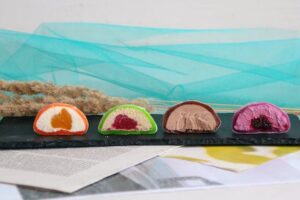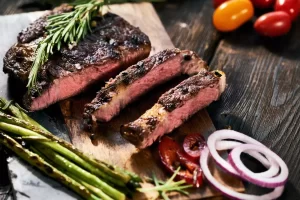The skin, the largest bodily organ, has numerous important functions. Ensuring good nutrition helps promote healthy skin year-round, but especially during the fall and winter months. In fact, seasonal weather changes can take a toll on skin and can worsen skin conditions. The combination of cold weather paired with dry indoor heat can negatively impact skin health. Here are some foods and nutrients to consume regularly to nourish your skin from the inside out.
The “Sunshine” Vitamin
Vitamin D is important for skin cell growth and repair and plays a role in wound healing. Vitamin D is known as the sunshine vitamin since sun exposure is the most effective way to obtain this nutrient. However, most people don’t spend enough time in the sun with ample skin exposed to meet their vitamin D needs. Dietary sources of vitamin D include fatty fish, beef liver, egg yolks, some mushrooms and foods and beverages fortified with vitamin D such as milk. Vitamin D supplements may be needed to bridge the gap for those who struggle with low blood vitamin D levels.
Omega-3 Fats
Omega-3 fatty acids are found in fatty fish like salmon, tuna and sardines, walnuts, flaxseeds, chia seeds and plant oils including soybean oil and canola oil. Omega-3 fats may fight red, dry and itchy skin caused by skin disorders. These fats can improve the function of the skin barrier by providing moisture and protecting against irritants. In addition, the anti-inflammatory properties of omega-3s may help prevent and reduce the severity of acne.
A to Zinc
A wide variety of micronutrients play an integral role in maintaining healthy skin. One of these nutrients is zinc. Foods like oysters, beef, poultry, eggs and dairy products are rich in zinc. Zinc is an essential mineral with antioxidant properties, helping to protect cells from damage. Zinc also promotes collagen production, supports wound healing and is involved in cell growth and division.
Hydrate
While optimizing hydration may not stave off fine lines and wrinkles, it may help with reducing signs of dryness and roughness while promoting elasticity and better skin tone. Not only is it important to drink adequate fluids, but also to consider what type of beverages are consumed. The best beverage for hydration is water, followed by other unsweetened beverages. For healthy skin, limit or avoid sugar-sweetened drinks and alcoholic beverages.
Queue Up the Cabbage
Broccoli and other cruciferous vegetables are rich in nutrients important for skin health. Vitamin C, vitamin A and the powerful antioxidant, sulforaphane, are plentiful in these leafy green veggies. In addition to broccoli, opt for Brussels sprouts, cabbage, cauliflower, kale, watercress and turnips. Not only does consuming these plants help maintain collagen levels in the skin, but they may protect against sun damage and skin cancer.
Maximizing Your Macronutrients
Calories are derived from carbohydrates, protein and fat. While all three of these macronutrients are important for maintaining healthy skin, protein plays a unique role. Protein may be recognized for its role in muscle building, but is also crucial for building and maintaining all tissues in the body including cartilage and skin. Consuming adequate dietary protein, from both plant or animal foods, is required for the body to synthesize proteins in the skin. Protein-rich foods include meat, chicken, fish and eggs as well as beans, whole grains, nuts and seeds. For those with difficulty consuming enough protein, protein supplements can be used to help reach daily protein needs.
Source : Los Angeles Daily News

































